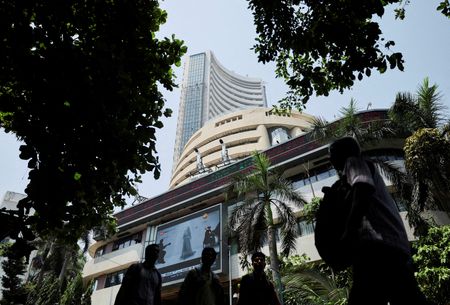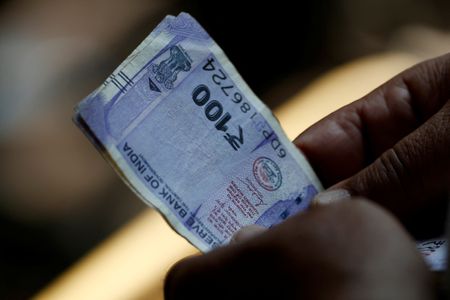By Urvi Dugar and Chandni Shah
BENGALURU (Reuters) -Jane Street has told staff it will contest a ban by India’s financial regulator which has accused the U.S. high-frequency trading giant of market manipulation, adding that its practices in question were “basic index arbitrage trading”.
Jane Street said it was “beyond disappointed” by what it called “extremely inflammatory” accusations from the Securities and Exchange Board of India (SEBI) and is working on a formal response, according to an internal email sent to employees over the weekend that was seen by Reuters.
The email did not elaborate on the potential action that Jane Street might take.
SEBI on Friday barred the firm from buying and selling securities in the Indian market and seized $567 million of its funds.
It alleged that Jane Street bought large quantities of constituents in India’s Bank Nifty index in the cash and futures markets to artificially support the index in morning trade, while simultaneously building large short positions in index options which were exercised or allowed to expire later in the day.
The regulator, which tracked Jane Street’s trading patterns for more than two years, has also widened its investigation to include other indexes and exchanges, a source has said.
Over the past three years, India’s derivatives market has had explosive growth as retail investors swarmed in and is now the world’s largest. But that has also led to losses for many ordinary investors, which has become a concern for regulators.
SEEKING LAWYERS
Jane Street has been sounding out Indian law firms for its upcoming battle with SEBI but has yet to hire one, said four sources with knowledge of the matter. They were not authorised to comment on the matter and declined to be identified.
The next step by Jane Street would likely be to lodge an appeal with the Securities Appellate Tribunal, the sources added.
Jane Street did not immediately reply to a request for comment on Monday.
In its email to staff, Jane Street said arbitrage trades were “a core and commonplace mechanism of financial markets that keeps the prices of related instruments in line.”
SEBI’s order that this activity is “prima facie manipulative” disregards the role of liquidity providers and arbitrageurs in markets, Jane Street added.
The proprietary trading firm also took issue with SEBI’s claims that it had failed to respond adequately to the regulator’s concerns, saying the firm’s executives had met with regulators and exchange officials multiple times.
“Once again, we left this process feeling that we had reached an understanding of the concerns and reflected them in modifications to our trading behaviour.”
“Since February, we have made ongoing efforts to communicate with SEBI and have been consistently rebuffed,” the email said.
SEBI said it had no comment beyond Friday’s order.
India accounted for roughly 60% of global equity derivative trading volume in May, according to the Futures Industry Association.
Data out on Monday showed that equity derivative losses for India’s retail traders widened by 41% to 1.06 trillion Indian rupees ($12.4 billion) in the financial year that ended in March.
SEBI Chairman Tuhin Kanta Pandey also said on Monday that the regulator was enhancing its surveillance to scrutinise manipulation in derivatives trading, but added that there may not be many more cases like Jane Street.
Other overseas proprietary trading firms that are active in India include Citadel Securities, IMC Trading, Millennium and Optiver.
($1 = 85.7070 Indian rupees)
(Reporting by Urvi Dugar and Chandni Shah in Bengaluru; Additional reporting by Ira Dugal and Jayshree P Upadhyay in Mumbai; Editing by Maju Samuel, Shailesh Kuber and Edwina Gibbs)











